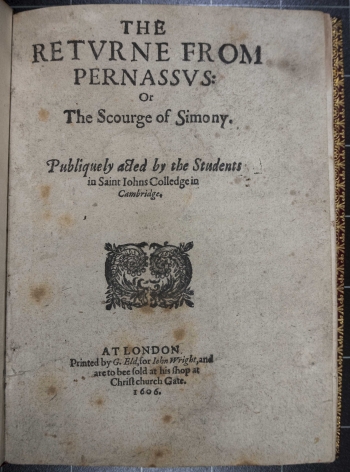Theatricals at St John's
 At the turn of the seventeenth century, Christmas entertainments at St John’s typically included a theatrical performance by the students. One such drama, performed in either 1601 or 1602, provides a unique insight into how the writers of the day were viewed by the student community. The Returne from Pernassus, or, the Scourge of Simony was the final and most ambitious of three Parnassus plays, authorship unknown. The plays give a humorous account of the adventures of two students, Philomusus and Studioso, the first recounting their life as students, the second their unsuccessful attempts to earn a living. By the third, the character Ingenioso, who appears in all the plays, has become a satirist, and he delivers a brief and pithy characterisation of the authors of the day. Such greats as Spenser, Marlowe and Shakespeare are among his subjects, as are both Ben Jonson and Thomas Nashe. Some later critics have identified Ingenioso with Nashe himself, and although it is by no means certain that the characters are intended to represent real people, it is clear that the author was very familiar with Nashe’s work.
At the turn of the seventeenth century, Christmas entertainments at St John’s typically included a theatrical performance by the students. One such drama, performed in either 1601 or 1602, provides a unique insight into how the writers of the day were viewed by the student community. The Returne from Pernassus, or, the Scourge of Simony was the final and most ambitious of three Parnassus plays, authorship unknown. The plays give a humorous account of the adventures of two students, Philomusus and Studioso, the first recounting their life as students, the second their unsuccessful attempts to earn a living. By the third, the character Ingenioso, who appears in all the plays, has become a satirist, and he delivers a brief and pithy characterisation of the authors of the day. Such greats as Spenser, Marlowe and Shakespeare are among his subjects, as are both Ben Jonson and Thomas Nashe. Some later critics have identified Ingenioso with Nashe himself, and although it is by no means certain that the characters are intended to represent real people, it is clear that the author was very familiar with Nashe’s work.
In the play, Ingenioso and Judicio join in praising Nashe:
Yet this I say, that for a mother witt, Fewe men have ever seene the like of it.
Whether this is respect for a writer only lately deceased, affection for a fellow Johnian, or simply appreciation of his writing style is a matter for speculation.
Later in the play, Shakespeare’s famous actors, Richard Burbage and William Kempe are portrayed, discussing the literary merits of scholars:
Few of the university pen plaies well, they smell too much of that writer Ovid, and that writer Metamorphosis, and talke too much of Proserpina & Juppiter. Why heres our fellow Shakespeare puts them all downe, I and Ben Jonson too. O that Ben Jonson is a pestilent fellow, he brought up Horace giving the Poets a pill, but our fellow Shakespeare hath given him a purge that made him beray his credit.
This was a reference to the so-called War of the Theatres in which rival poet playwrights competed to caricature their adversaries in an exchange of plays. In Poetaster, of 1601, Jonson had represented himself as Horace against his detractors, in response to which, Shakespeare's company had performed Thomas Dekker's Satiromastix, in which Horace the bricklayer (Jonson's family trade) was the humorous poet untrussed. It is fascinating to see how students at St John’s were aware of contemporary events on the London stage and reflected these in their own theatrical performances.
The Returne from Parnassus is currently on display in the Library Exhibition area, as one of the exhibits in ‘Remembrance with Posteritie’, featuring the life and work of Ben Jonson and Thomas Nashe. The exhibition runs from 3 February to 22 April, open Monday to Friday 9-5 (closed Good Friday and Easter Monday).
This Special Collections Spotlight article was contributed on 3 February 2016 by the Special Collections Librarian.
